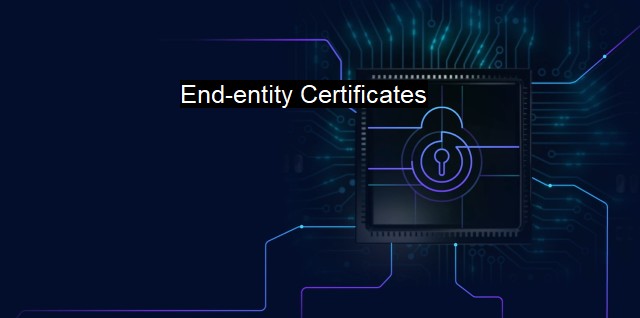What are End-entity Certificates?
Securing Online Transactions and Identities with End-Entity Certificates in Public Key Infrastructure: A Fundamental Component of Modern Cybersecurity and Antivirus Strategies
End-entity certificates are central to the understanding of how cybersecurity operates, particularly in relation to antivirus software and secure communication protocols. An end-entity certificate is an integral part of public key infrastructure (PKI); a scheme used to securely transmit data across potentially insecure networks such as the internet.These certificates are essentially digital documents that authenticate an entity's identity in the digital sphere. It validates users, computers, networks, and services in a PKI, allowing computers to trust each other when performing sensitive operations. Named 'end-entity' since they reside at the endpoints of secure connections, these certificates breathe life into the concept of trust on the internet, and are crucial to protecting against malicious attacks.
An end-entity certificate, or leaf certificate, holds vital information stringently tied to the holder’s identity, including their public encryption key. It is involved in source authentication, authorization and encryption, providing the necessary information to initiate secure connections. Once issued, a client device presents this certificate to assert its validity during secure online connections. If the certificate can be validated, usual services can proceed.
There are various types of end-entity certificates, with different domains of application. a TLS (Transport Layer Security) server certificate is used in HTTPS connections, a type of connection that we all commonly employ when we visit websites or use online services. Another variant, like S/MIME certificates, aid in securing and verifying email communications. Each specific certificate is thus adapted for a specific task; all with a common objective: providing secure and trusted communication.
Certificate authorities (CAs) are trusted third-parties who issue end-entity certificates. CAs verify the entity’s identity and requests, and if everything checks out, it crafts the certificate, signs it and sends it back to the requester. Browsers and software systems work with a list of trusted CAs, building a certificate chain from the trusted root down to the end-entity certificate.
End-entity certificates need to be handled with caution. They have a lifespan and must be renewed when expired. Ever come across browser warning about a website having an invalid or expired certificate? That's the role of end-entity certificate at work. when recipient devices reject the end-entity certificate or cannot confirm its CA’s credentials, that's another problem with potentially dangerous implications; it could imply that either the certificate is counterfeit or that there is a Man-In-The-Middle (MITM) attack in play.
Connecting to real-world cybersecurity, antivirus software can make use of these end-entity certificates. It alerts you when your web connection is unsafe— such as if the web server cannot present a proper and valid certificate. This action from the end-entity certificates helps the antivirus system to identify and block potentially dangerous web content and downloads from untrusted certificates carriers.
End-entity certificates provide a critically important certification mechanism meant to establish and implement internet security. They assure the trusted and safe exchange of sensitive information across a network environment by encrypting the transmitted data and authenticating the identity of the existing entity. Technologies such as antivirus software capitalize on these digital certificates, implementing smarter and stronger security agents against digital threats. In the grand tapestry of modern cybersecurity, end-entity certificates and the PKI that manage them, form a cornerstone on which many secure operations base their very functionality.

End-entity Certificates FAQs
What is an end-entity certificate?
An end-entity certificate, also known as a leaf certificate or client certificate, is a digital certificate issued to an individual or organization to secure online communication with another entity.How does an end-entity certificate work in cybersecurity?
End-entity certificates help establish secure communication by verifying the identity of the certificate holder and ensuring that the data transmitted between entities is encrypted and cannot be intercepted. This helps prevent unauthorized access, data breaches, and cyber attacks.Why is it important to have an end-entity certificate for antivirus software?
Having an end-entity certificate for antivirus software ensures that the software is legitimate and not a malicious program that could infect your computer. The certificate authenticates the software, confirming that it was developed by a trusted source and has not been tampered with.What are the common types of end-entity certificates used in cybersecurity?
The most common types of end-entity certificates used in cybersecurity are SSL/TLS certificates, code signing certificates, and email encryption certificates. SSL/TLS certificates are used to secure websites and online transactions, code signing certificates are used to sign software and ensure its authenticity, and email encryption certificates are used to encrypt email communication.| | A | | | B | | | C | | | D | | | E | | | F | | | G | | | H | | | I | | | J | | | K | | | L | | | M | |
| | N | | | O | | | P | | | Q | | | R | | | S | | | T | | | U | | | V | | | W | | | X | | | Y | | | Z | |
| | 1 | | | 2 | | | 3 | | | 4 | | | 7 | | | 8 | | |||||||